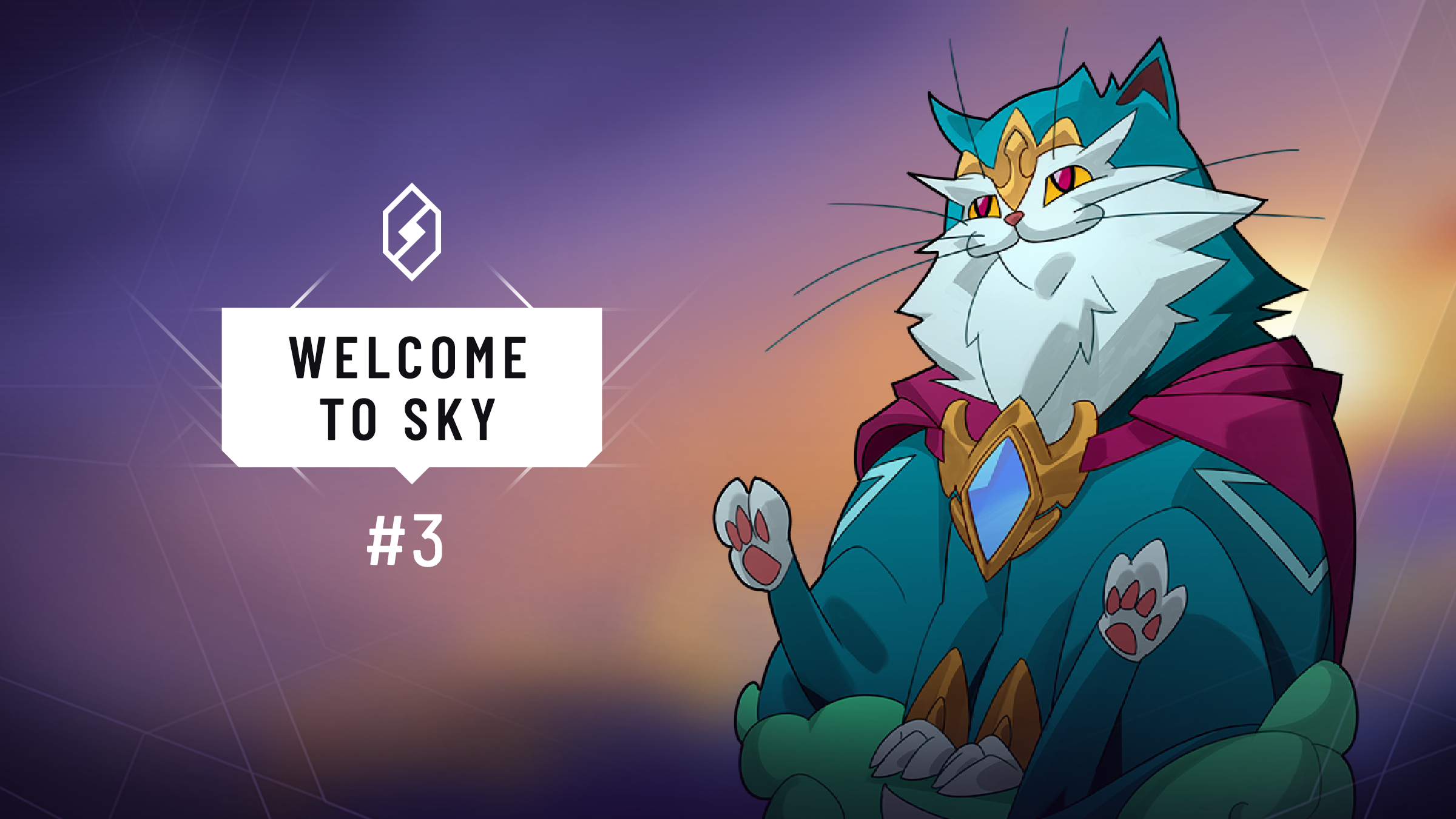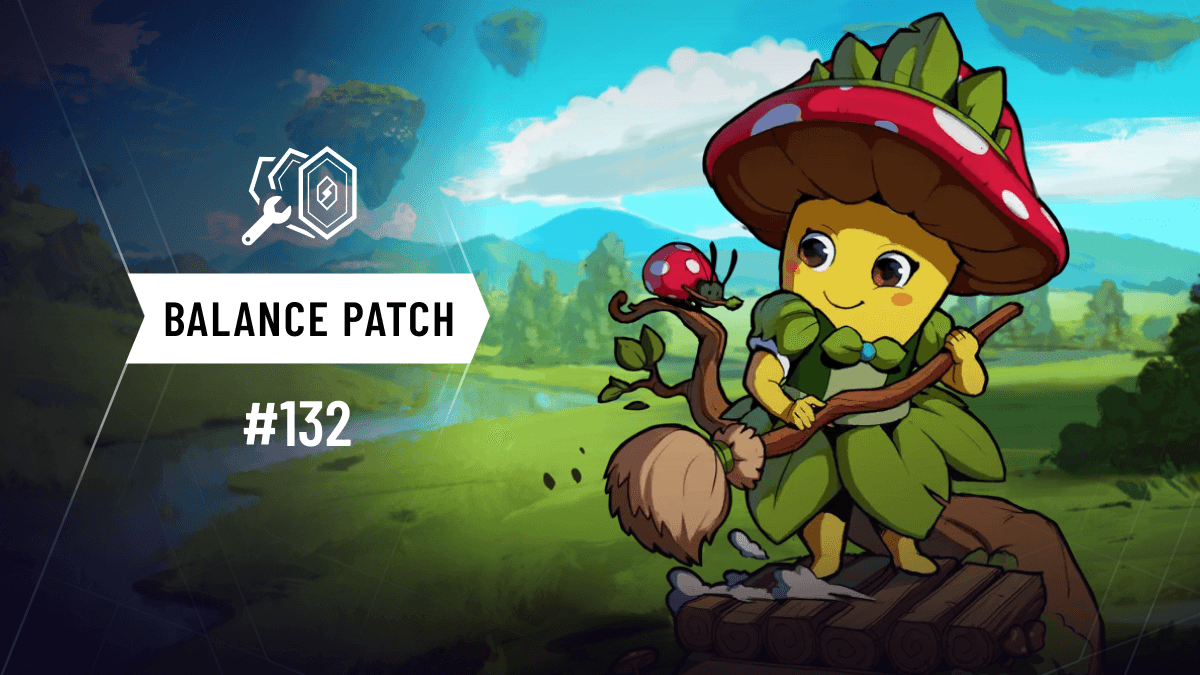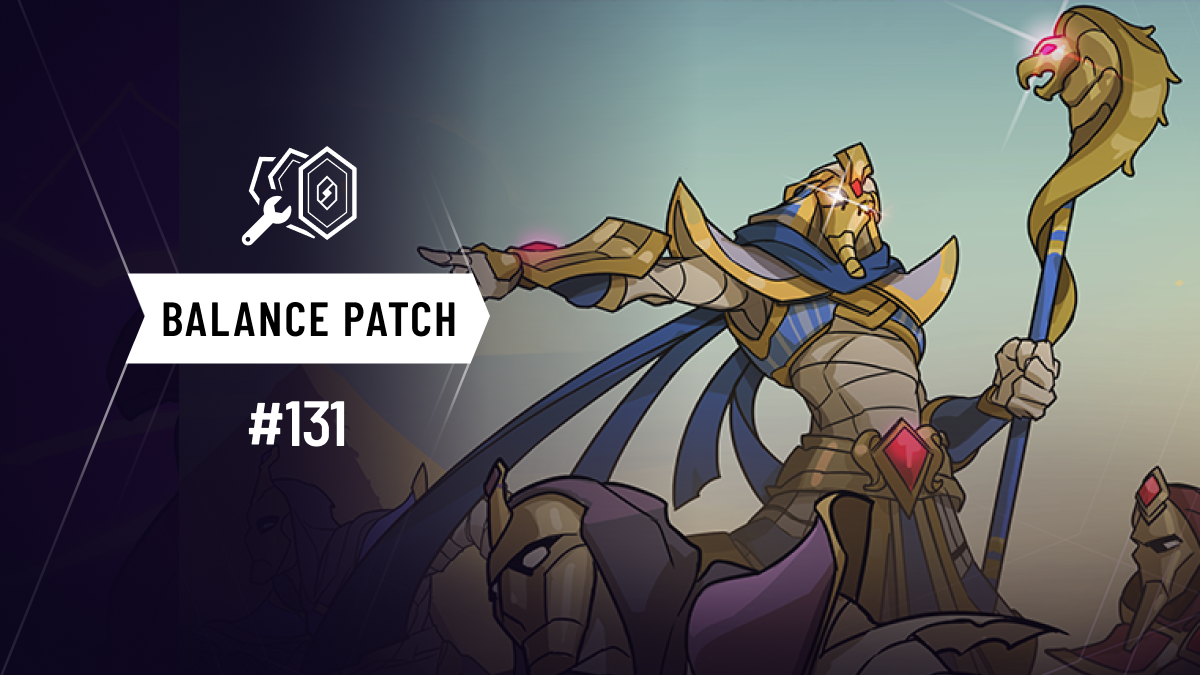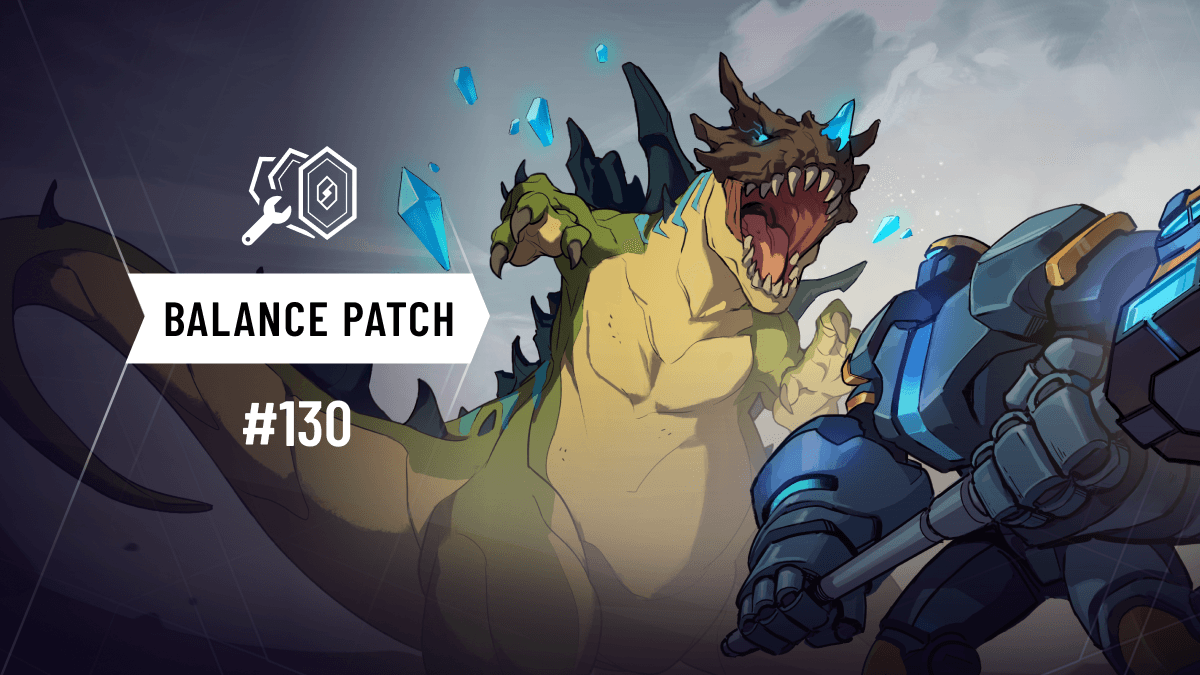Welcome to Sky #3: Combat Keywords & Triggered Abilites

(Updated March 16, 2020 with new info and rules changes)
Welcome back to our introductory blog series on the gameplay and strategy of SkyWeaver! Today, we’re taking a look at the Combat Keywords and Triggered Abilities we have in SkyWeaver, the effect they have on gameplay, and how you can make use of them to gain the advantage over your opponents.
In SkyWeaver, the primary recurring terms you'll see are our six Combat Keywords, which affect how Units and Heroes fight, and our seven Triggered Abilities, which apply effects only when certain conditions are met to trigger their activation, such as playing a certain type of card, summoning a Unit, attacking your opponent, etc.
Post 1 - The Basics of SkyWeaver
Post 2 - Player Actions
Post 3 - Keywords
Post 4 - Enchantments
Post 5 - Prisms
Post 6 - Discovery Mode
Post 7 - Elements of SkyWeaver
Post 8 - Constructed Deckbuilding Part 1
Post 9 - Constructed Deckbuilding Part 2
Post 10 - Top Cards of 2019 Part 1
Post 11 - Top Cards of 2019 Part 2
Post 12 - Top Cards of 2019 Part 3
Post 13 - Introducing Intellect
Combat Keywords
Combat Keywords have an effect on unit-to-unit combat, typically by changing how damage works or changing the rules of how attacking works by forcing enemy characters to attack certain Units, or preventing them from attacking others. All Combat Keywords can be removed by the Enchant Chains, but cannot be suppressed by the Silence Enchant. You can read more about all our Enchants in their own post here - Post 4 - Enchants.
Armor
A fairly straightforward but powerful keyword, Armor prevents 1 damage to a character whenever that character would take damage. Armor is incredibly strong since it will reduce all 1-damage sources to 0, which means that you cannot use your Hero to attack and damage a Unit with Armor, unless you have a way to increase your Hero’s power, and even then, the damage will still be reduced. It can routinely force your opponent to use numerous removal cards to destroy a single Unit, and is perhaps our most powerful keyword. Armor is visually indicated by a glowing ring of energy around a Unit’s health.
Banner
Banner is a unique Combat Keyword in that it does not affect the Unit itself, but rather, your Hero. For each character you have with Banner, your Hero gains +1 power. These buffs stack. Two instances of Banner will grant +2 power, three grant +3, etc. Banner is visually indicated by a sparkling glow around the Unit’s art.
Banner also appears on Spells, and functions a little differently on Spells than it does on Units. A Spell with Banner will give your Hero +1 power during the turn it is played, though this power boost will wear off at the end of the turn.
Guard
Units with Guard protect your Hero from attacks. While you have a Unit with Guard in play, enemy characters cannot attack your Hero, and as a result, will be forced to destroy your Guard Unit(s) first. Guard Units will not protect your other non-Stealth Units from being attacked, however! Units with Guard will always be placed to the right of your Hero. Guard is visually indicated by a Unit’s shield shaped frame.
Lifesteal
Whenever a Unit with Lifesteal damages the enemy Hero, your Hero will gain that much health. However, if a Unit with Lifesteal damages another unit, your hero won't gain any health. You need to commit the Unit to striking the enemy Hero to heal yourself, which forces you to choose whether to attack the enemy hero and use your Lifesteal Units to heal, or try to fight against enemy Units, since you cannot do both at once. Lifesteal is visually indicated by swirls of pink energy orbiting the Unit’s power.
Lifesteal also appears on Spells, and has the same function—if a Spell with Lifesteal deals damage to the enemy Hero, it will cause your Hero to gain that much health.
Stealth
Units with Stealth cannot be attacked until their Hero has been damaged by a unit or spell in the same turn, at which point their Stealth will be lost until the end of the turn. As a result of this, you can use Guard Units to “protect” your Stealth Units by preventing enemies from attacking and damaging your Hero, keeping your Units’ Stealth active, and preventing them from being attacked. Units with Stealth are always be placed to the left of your Hero, but to the right of those without Stealth. Stealth is visually indicated by the distortion and haze surrounding the Unit and its card frame.
Wither
Whenever a Unit with Wither deals damage to a Unit (but not a Hero), it will damage both the unit's health and power. As an example, if a 4/4 Unit takes 2 Wither damage, it will be reduced to a 2/2, rather than a 4/2. This makes Wither particularly great defensively, as it can weaken enemy Units and allow your allies to take less damage when attacking them, and just reduce enemies damage output overall. Wither also appears on Spells, and has the same function. If a Spell with Wither deals damage to a Unit, it will cause that Unit’s power to be reduced by the same amount as its health was. Wither is visually indicated by an aura of dark energy around the Unit’s power, as well as a burst of dark sparks when a Wither card deals damage.
Triggered Abilities
These differ from Combat Keywords in that they do not affect combat, and are triggered by certain conditions being met, like a Unit being played, destroyed, a turn starting or ending, etc. Additionally, these Abilities will be temporarily suppressed by the Silence Enchant, but cannot be removed by the Chains Enchant. Check out - Post 4 - Enchants for more info on them.
Death
A Unit’s Death effect will trigger when the Unit destroyed and sent to the Graveyard from play. As an example, the Unit Royal Mummy has Death: Give your Hero +3 health. So when it dies, it will increase your Hero’s health by 3. Death effects are great because they can occur on your opponent's turn, messing with their plans and forcing them to play more cautiously. Death effects can be avoided by removing the unit from play without destroying it, such as by returning the Unit to a player’s hand or deck, or by using an effect that "Dusts" the Unit.
When a Unit is Dusted, it is not sent to the Graveyard, and as a result, its Death effect will not work. Dusting a card removes it from the current game entirely.
Glory
A Unit’s Glory effect will trigger whenever the Unit successfully attacks and deals damage to a Hero (usually the enemy). As an example, the Unit Tiamat will deal 3 damage to all enemy Units and cause the enemy to lose 1 max mana when it successfully attacks their Hero. Glory effects are typically quite powerful, but can also be difficult to pull off, since the Unit has to live a turn and then successfully attack and damage the enemy Hero to activate them. As a result, removal Spells, Guard Units, effects that reduce the Unit’s power, and certain Enchants can all prevent a Glory effect from successfully activating.
Inspire
A Unit’s Inspire effect will trigger after you play a card that meets the conditions listed on the Inspire effect. As an example, the Unit Scythe Mantis has Inspire Dark: Deal 1 Damage to enemies. This means it will deal 1 damage to all enemies whenever you play a dark card, whether a Unit or Spell, including attached Spells, like the Wane Blade attached to Scythe Mantis.
As Inspire effects are so powerful, Inspire Units tend to be high-priority targets for removal, so it is often advisable to hold off on playing Inspire Units until you can get some use out of their effect immediately. A final important note is that, unlike other abilities, a Unit needs to be alive and in play to trigger its Inspire effect. For example, if you were to use a dark Spell to destroy your own Scythe Mantis, its Inspire effect would not trigger.
Play
A Unit’s Play effect will trigger whenever you pay its Mana cost to "Play" it from your hand. It will not trigger if the Unit comes into play from your deck, Graveyard, or even hand, unless it was properly "Played" by paying mana. Many Play effects require you to choose a target as you play the Unit, just as a Spell would. They can also be played without a target, but be careful, because the Play effect will be wasted in this case.
Summon
A Unit’s Summon effect will trigger whenever that Unit enters play from anywhere, regardless of how it entered play. Summon effects are frequently quite powerful, since they're almost like getting a free attached Spell that’s used immediately, and are especially powerful when reviving Units from the Graveyard or summoning them off other effects, since they cost no additional Mana to use. The downside is that you can’t save a Summon effect for later.
Sunset
Your Units' Sunset effects will trigger at the end of your turn. These effects are generally pretty reliable, but unlike Summon effects, they don't allow you to take any further actions after the effect activates, since they can only occur at the end of your turn. As such, they offer a little less flexibility, and require a bit more planning to take advantage of.
Sunrise
Your Units' Sunrise effects will trigger at the start of your turn. Similarly to Glory effects, Sunrise effects can be somewhat unreliable and tricky to get off, since your opponent has an opportunity to kill off the Unit before the effect activates, but they are a bit more forgiving, since unlike Glory, they do not require you to do anything beyond starting your turn with the unit intact.
That's all for this post, check back soon for more SkyWeaver info!
Lethal Puzzle
See if you can figure out how to defeat your opponent using the game state presented below, in just one turn! Solution will be in the next post!
The solution to our last post's lethal puzzle is also right below! Congratulations to everyone who solved it!
To chat with me and the rest of the Horizon Games team & our community, join our Discord server! Subscribe to our subreddit to share your ideas, and follow the SkyWeaver account on Twitter if you just want to say hey!
If you haven't already, be sure to sign up to become a SkyWeaver now and to join our waitlist to be invited into our private beta and check out all these new features for yourself.
Check back here again soon, and to get notified on our latest blog posts, subscribe to our newsletter.

Recent Posts














